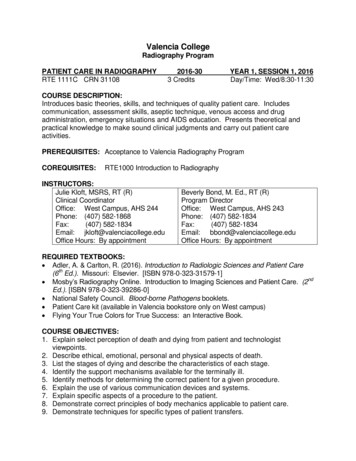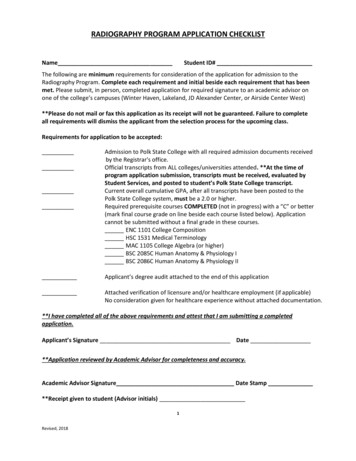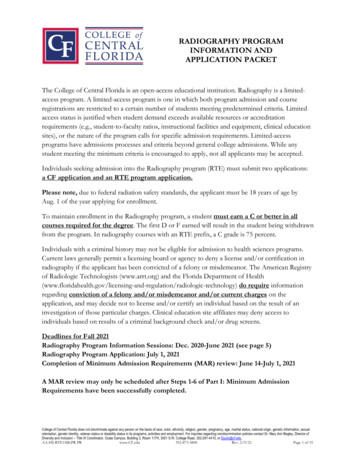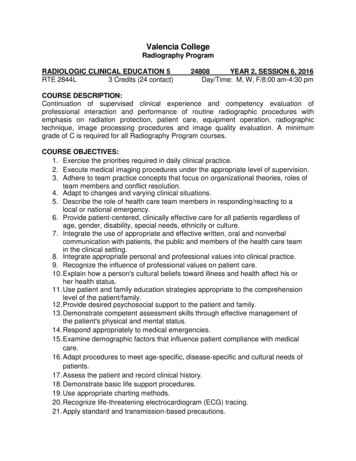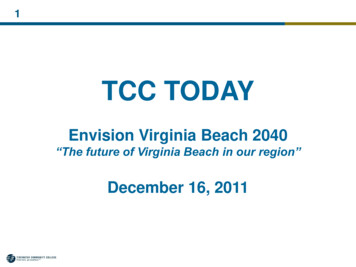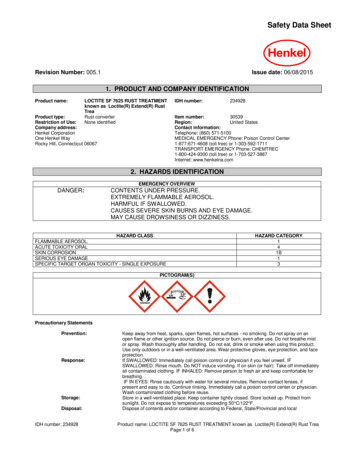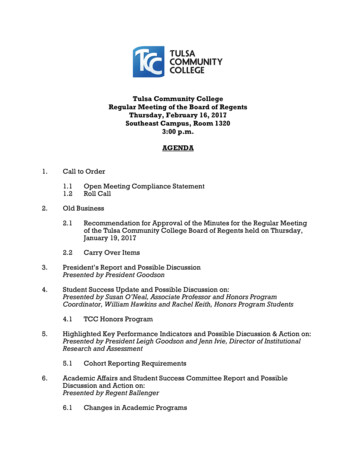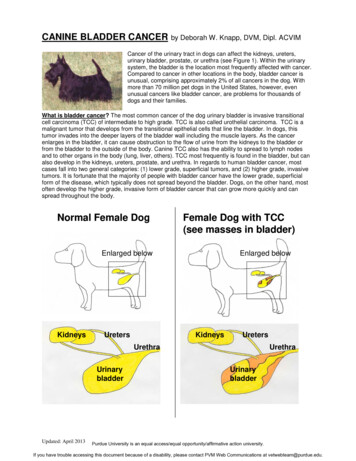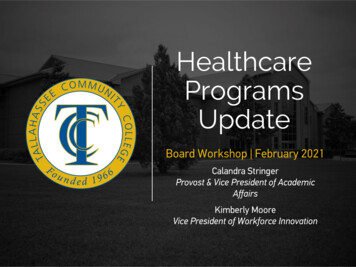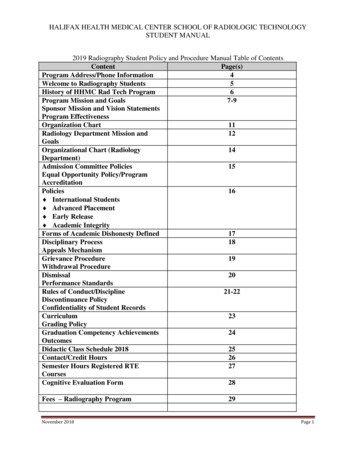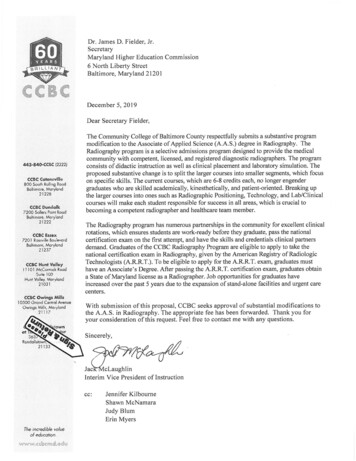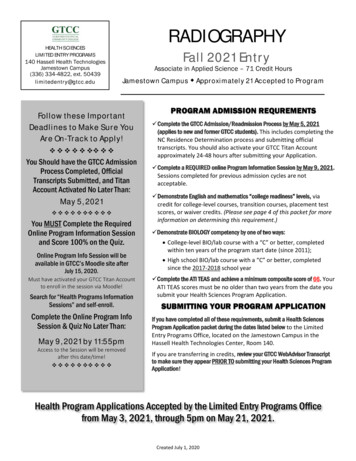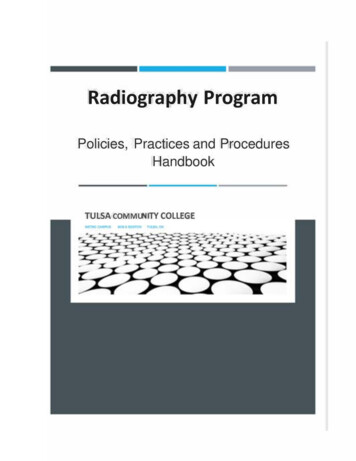
Transcription
Radiography ProgramPolicies, Practices and ProceduresHandbookTULSA COMMU TY COLLEGE
TABLE OF CONTENTSIntroduction1Program Mission Statement and Goals2Organizational Chart & Clinical Education Centers3Curriculum4Technical and Professional StandardsAdmission Guidelines5-67Academic Progression Policies/Grading Policy8-9Electronic Device/Social Media Policies10Counseling Policy10Counseling Form11Accidents12Universal Precautions12-14Hazard Exposure/Insurance15Incident Report Form16Uniform Requirements17Radiation Monitoring18Pregnancy Policy19-20Conduct & Professional Behavior21Supervision of Clinical22Clinical Attendance Policy25Clinical Records & Clinical Evaluations26-27
Competency EvaluationsCompetency Categories & Clinical Competency FormEarly Clinical Release PolicyCompetency ChecklistJRCERT Standards for an Accredited Educational Program inRadiologic SciencesComplaint Resolution Policy2829-333435-373839-40The policies and procedures in this handbook are based upon present conditions and are subject tochange. The Radiography program reserves the right to modify any statement in accordance withunforeseen conditions.
Revised August 2020TULSA COMMUNITY COLLEGERADIOGRAPHY PROGRAM POLICIES AND PROCEDURES HANDBOOKINTRODUCTIONThis handbook has been developed to aid Students, Faculty, Clinical Instructors and Radiographersinvolved with the Tulsa Community College (TCC) Radiography Program. It should be used as a guidefor all students during their Radiography training. Policies, rules, rights and responsibilities areestablished in this handbook.The students are also governed by the policies as stated in the TCC Student Handbook, Policies of theAllied Health division, the policies and procedures of the clinical education center where they areassigned, and the Code of Ethics established by the American Registry of Radiologic Technologists(ARRT).The Tulsa Community College Radiography Program faculty developed this Student Handbook onJanuary 1, 1983 in compliance with the essentials of the Joint Review Committee on Education inRadiologic Technology, and it is updated yearly to reflect current practice and compliance with theJRCERT Standards for a Program in Radiologic Technology. The Radiography Program faculty reservethe right to make policy and procedure changes when necessary.The Tulsa Community College Radiography program welcomes recommendations for changes from allcommunities of interest.The Radiography Program follows student policies given in the Tulsa Community College StudentHandbook and the School of Health Sciences Division Policies and Practices unless otherwise listed inthis book.1
PROGRAM MISSION STATEMENTThe Radiography program at Tulsa Community College is a six-semester curriculum designed toprovide students the opportunity to become ARRT registered Radiographers capable of providingexcellent patient care, medical images, and service to their community.Goal #1PROGRAM GOALSProgram graduates will pass the registry exam for Radiography administered by theAmerican Registry of Radiologic Technologists (ARRT)Goal #2Program graduates will become successfully employed in medical imaging.Goal #3Program graduates will possess the level of knowledge necessary for professionalgrowth.STUDENT/GRADUATE GOALSGoal #1Program graduates will be clinically competent.Students will: Position patients Deliver appropriate patient care Operate radiographic equipment Employ radiation protection practices Understand radiation exposure guidelinesGoal #2Program graduates will demonstrate critical thinking/problem solving skills.Students will: Evaluate radiographic images Select exposure factors Perform non-routine examsGoal #3Program graduates will demonstrate professional growth and development.Students will: Understand the function of professional organizations Demonstrate professional behaviors Make ethical decisions Support the efforts of the Radiologic CommunityGoal # 4Graduates will demonstrate effective communication skills.Students will: Communicate with patients Present an oral report Make a presentation Use professional terminology2
TCC METRO CAMPUS ORGANIZATIONAL CHARTRADIOGRAPHY PROGRAMPRESIDENT / CEOVICE - PRESIDENTSPROVOSTMETRO CAMPUSDEAN OF HEALTH SCIENCESRADIOGRAPHY PROGRAM FACULTYHOSPITAL CLINICAL INSTRUCTORSSTAFF TECHNOLOGISTSSTUDENTSCLINICAL EDUCATION CENTERSSaint Francis HospitalSaint John Medical CenterOSU Medical CenterHillcrest Claremore HospitalClaremore Indian HospitalHillcrest South HospitalSaint Francis SouthSELECTION OF CLINICAL EDUCATION CENTERWhen accepted to the program, students will be given the opportunity to select the clinical educationcenter of their choice as long as there is an available opening. If a clinical center is full, students will begiven the opportunity to make another selection. If a selection cannot be made, the student will haveto wait to begin the program the following year.Once a clinical center has been assigned, students will be expected to remain at their assigned sitethroughout their training. Only under extreme situations will a student be permitted to move toanother clinical education center. Student should contact the program director for furtherinformation.RELATED STUDENTSStudents will not be permitted to attend a clinical site in which his/her relative may work in the samedepartment, and students that marry radiology personnel will be transferred to another ClinicalEducation Center as soon as an opening becomes available. Student’s children WILL NOT be permittedto attend any radiography classes or clinical.3
CURRICULUMThe Radiography Program is a two-year (six-semester) program consisting of 48 credit hours ofRadiography courses (didactic and clinical) and 22 hours of related general education courses. Lectureand clinical courses run concurrently throughout the two years. Upon completion of the program,graduates receive an Associate in Applied Science (AAS) degree and are eligible to apply forexamination by the American Registry of Radiologic Technologists (ARRT) in Radiography (R).Clinical education classes consist of a complete eight-hour shift in the assigned clinical educationcenter.Descriptions of courses in the Radiography curriculum may be found in the TCC catalog or website.The arrangement of classes and clinical education during the six semesters is as follows:FIRST YEAR - SUMMER SEMESTERCredit Days ofHours the Week2MW1MW3RADT 1212 Introduction to RadiographyRADT 1211 Introduction to Radiographic LabTotal HoursFIRST YEAR - FALL SEMESTERRADT 1313 Radiographic Anatomy & Pos. I3MWFRADT 1372 Radiographic Technique2MWFRADT 1324 Radiographic Clinical Education I4T ThEvenings or WeekendsBIOL 1314 Human Anatomy & Physiology4ENGL 1113 Freshman Composition I3MWOnline or BlendedTotal Hours16FIRST YEAR - SPRING SEMESTERRADT 1333 Radiographic Anatomy & Pos. II3MFRADT 1383 Advanced Radiographic Technique3MWRADT 1344 Radiographic Clinical Education II4T ThMATH 1473 Math for Critical Thinking or3MW Online or BlendedMATH 1513 College Algebra3MW Online or BlendedENGL 1213 Freshman Composition II or3MW Online or BlendedENGL 2333 Tech/Professional Writing or3MWENGL 2343 Business Communications3MWTotal Hours16SECOND YEAR - SUMMER SEMESTERRADT 2301 Radiographic Seminar1WRADT 2312 Radiographic Clinical Education III2T ThTotal Hours3SECOND YEAR - FALL SEMESTERRADT 2343 Radiographic Biology & Pathology3T ThRADT 2336 Radiographic Clinical Education IV6MWFRADT 2383 Radiographic Physics3T ThHIST 1483 Amer. Hist. 1492-1865or3T Th Online or BlendedHIST 1493 Amer. Hist. 1865-Present3Total Hours15SECOND YEAR - SPRING SEMESTERRADT 2323 Radiographic Special Procedures3T ThRADT 2356 Radiographic Clinical Education V6MWFPOSC 1113 American Federal Government3T ThALDH 1323 Medical Terminology3T Th Online or BlendedTotal Hours15NOTE: RADT 2312, 2336, 2356 require a 2 week 1pm – 9pm rotation4
TECHNICAL AND PROFESSIONAL STANDARDS FOR MEDICAL RADIOGRAPHYA student entering the radiography program at Tulsa Community College should be aware of thefollowing performance requirements necessary to fulfill the job requirements of a registered medicalradiographer (ARRT (R)).EDUCATION: Must be a graduate of an educational program in radiography which has beenaccredited by a mechanism acceptable to the American Registry of Radiologic Technologist. TulsaCommunity College is accredited by the Oklahoma State Regents for Higher Education, the HigherLearning Commission (HLC) plus specific programmatic accreditation by the Joint Review Committee onEducation in Radiologic Technology (JRCERT).SKILLS: Radiography graduates of Tulsa Community College will be expected to exhibit cognitive,technical and interpersonal skills and demonstrate the following competencies as adopted by the TulsaCommunity College Radiography Advisory Committee.The graduate will be able to:1. Exhibit a proficiency in routine office and filing procedures of a radiology department in order tomaintain proper patient records and patient confidentiality in accordance with HIPAA regulations.2. Operate automatic developing equipment and digital imaging equipment, process radiographs andmaintain quality control of automatic processing and digital imaging equipment.3. Demonstrate a professional appearance of themselves and their radiology department, anddemonstrate an ethical relationship with all personnel.4. Select and operate the proper equipment and accessories to provide the patient with the bestpossible radiographic examination.5. Scientifically select the proper technical factors to produce the highest quality radiographs with thelowest possible radiation exposure to the patient.6. Transport and position patients for all routine radiographic procedures; including portables,surgery and selected special procedures; while maintaining the highest standard of radiationprotection for the patient and the technologist.7. Administer, or assist a physician in administering, contrast media and other common medicationsused in radiography.8. Assist in medical emergency situations as necessary.9. Practice proper sterile techniques and isolation procedures to prevent contamination and promotedisease control for the patients and all other personnel.10. Perform in all areas of the radiology department with full responsibility in the performance of allroutine and selected special procedures.5
11. Assist in the instruction and evaluation of future radiographers.12. Assume responsibility for other duties as delegated by their supervisor or physicians.13. Demonstrate a basic knowledge of advanced imaging modalities.14. Demonstrate college level reading and writing skills.15. Understand and be able to apply knowledge of the history of the United States.16. Understand and be able to apply knowledge of the study of American Federal Government.17. Apply psychological principles to human relation problems with special emphasis on groupdynamics, interpersonal communications and decision making.18. Demonstrate general knowledge of anatomy and physiology of the human body and how it relatesto radiography.19. Possess an understanding and demonstrate proper usage of Standard and Isolation Precautionswhen dealing with blood borne pathogens.PHYSICAL/MENTAL WORKING CONDITIONS:Radiography graduates should possess the following physical and mentalcapabilities to adequately perform in this occupation:Frequently RequiredWork ullingBalancingSquatting/ CrouchingStooping/BendingFrequently RequiredHand Activities:Grasping/turningFine ManipulationGraspingOccasionally RequiredWork Activities:SittingClimbingCrawlingContinuously RequiredWork eeingContinuously Required Mental ivePatienceAlertnessPrecisionAnalytic abilityProblem solvingConcentrationCommunication with peopleStrength Rating: On the job a radiographer must be able to lift/assistUp to 20 pounds ( Light ) Continuously21 to 50 pounds ( Medium ) Frequently50 to 100 pounds ( Heavy ) Frequently6
ADMISSION GUIDELINES TO RADIOGRAPHY PROGRAMThe following guidelines have been adopted to be used in the selection of students to the RadiographyProgram.I. Students must meet all of the following criteria before admission will be considered:1. Must be a high school graduate or equivalent (G.E.D).2. Application to the college and the program must be submitted before February 1.3. Must have a minimum cumulative GPA of 2.0 or better.4. Must attend an orientation session with the program director scheduled before March 30.II. Selection will be made according to the following criteria:1. Overall Grade Point Average. NOTE: If a student has less than 12 college hours, then an averageof high school and college GPA will be used.2. ACT Scores are required. There is no minimum required ACT score for this program.3. A national background check approval, vaccination records, or lab titers, current BLS-CPRcertification, current PPD test, and negative drug screen.III. Applicants will be ranked according to the following formula:1. Math ACT Score Science ACT Score divided by 2 Composite ACT Score divided by 2 OverallGPA divided by 2 Ranking Score.2. Completion of required General Education courses other than BIOL 1314 will be worth 1 pointeach added to the ranking score. Maximum of 2 points are given for completing 2 or moreadditional science classes.3. Completion of BIOL 1314 - Anatomy & Physiology with a grade of "C" or better will be worth 3points added to the ranking score.4. Applicants with a medical certification or degree will receive an additional point for each levelof achievement. Healthcare certification 1 point, Bachelor’s 2 points, Master’s 3 points, etc.Students with the highest ranking will be selected first. Since the Radiography program has a limitedenrollment, based on the number of clinical spots available, per year only the top ranking applicantswill be selected.Students with a grade point average of less than a 2.00 and/or on academic probation WILL NOT beconsidered for admission to the program until GPA is raised or academic probation is discontinued.NOTE: Admission to the Radiography program, or any TCC health program, is contingent upon studentscompleting and passing a national background check with sex offender and fraud registry check and passing adrug screen prior to beginning the program. Students will also be required to submit current CPR certification forAmerican Heart BLS Healthcare Provider, and immunization records to satisfy clinical contract requirements.Please refer to the School of Health Sciences policies available in the Health Sciences office (MP256).7
POLICIES RELATED TO PROGRESSION IN THE RADIOGRAPHY PROGRAMA. Academic Probation A cumulative grade point average of 2.0 (C) or higher on all academic work must bemaintained. At the end of any academic term in which a student's cumulative grade pointaverage falls below 2.0, the student will be placed on Academic Probation. (Tulsa CommunityCollege Catalog). When a radiography student is placed on academic probation, the student has one semesterto obtain satisfactory academic standing to continue in the radiography program. Aradiography student on academic probation for the second continuous semester mustwithdraw from the program. The student can apply for re-admission the following year.B. Incomplete Grades Incomplete ("I") grades may be assigned by faculty as outlined in the Tulsa Community Collegecatalog. A grade of "I" in a radiography course must be changed to a grade of C or better forthe student to progress to the next radiography course.C. Criteria for Completion of the Radiography Program A student must complete all Radiography courses within a period of three years after beingaccepted into the Radiography program. This allows for repetition of only one semester ofradiography courses. If a student withdraws from or fails a Radiography course re-admission to the program thefollowing year is not guaranteed and is dependent on clinical placement availability. If noclinical spot is available, the student cannot be re-admitted to the program. In this event, thestudent can re-apply for admission to the program the following year and will be rankedaccording to the criteria previously outlined. If there are clinical site placements available, those students wishing to be considered for readmission will be placed on a waiting list and the ranking criteria for the waiting list is asfollows:o No incidents of unprofessional conduct.o Successful completion of the aforementioned radiography course.o Ranking for re-admission will be based on the GPA for all completed radiographycourses. If a re-admitted student, who previously failed a radiography course, fails again he/she willnot be eligible for re-admission to the program for a period of no less than 2 years, and mustcomplete the admission requirements. The student will be ranked according to the criteriapreviously outlined. If a student has been formally requested to be removed from a clinical education center, anattempt will be made to locate another site. If no other site can be secured they mustwithdraw from the program. Any student requested removed from two clinical sites mustwithdraw from the program and will not be re-admitted to the program. Students may be ADMINISTRATIVELY WITHDRAWN FROM THE PROGRAM BY THE PROGRAMDIRECTOR at any time due to a student’s unethical or unprofessional conduct, uncleanness,use of profanity, poor attendance, violation of clinical education center or Tulsa CommunityCollege policies, falsifying records, etc.8
GRADING POLICYThe following grading scale is used in all RADT courses:93 - 100% A85 - 92% B75 - 84% CBelow 75% FStudents must receive a minimum grade of C in any RADT course to continue in the program. Students must accrue 75% of the total points possible on exam scores alone before otherscores are included in the final average. Earning less than 75% of the total possible exampoints results in failure of the course. Earning less than 75% of the total possible points forthe semester will also result in failure of the course. Clinical grades will be based on competencies, assessments, unassisted procedures,attendance, mid-term and final exams. STUDENTS MUST PASS MID-TERM AND FINALCLINICAL EXAMS IN ORDER TO CONTINUE IN THE PROGRAM. If a clinical exam is failed thefailing grade will be the grade recorded, and students are given one chance to re-take theexam in an effort to achieve a passing score. If a passing score cannot be achieved, thestudent must withdraw or will be administratively withdrawn from the program.Required competencies will be stated in the syllabus each semester according to the objectives listed.The clinical evaluation grade will be an average of the TCC faculty member, clinical instructor, andregistered technologist’s assessments.Anyone with less than 75% average at Mid-term will be placed on program probation for the rest of thesemester. Program probation will be used to inform student of the possibility of failing the course. Ifperformance cannot be improved, student should withdraw from the course.VACATIONS, HOLIDAYS AND PERSONAL DAYSStudent vacation periods and holidays coincide with those identified on the TCC Academic Calendar.Students will be allowed six (6) personal days during clinical education throughout the two-yearprogram.WEATHER POLICYDuring hazardous weather conditions which result in the closing of Tulsa Community College,Radiography students are not required to attend class or clinical for that day.Students should not jeopardize their safety at any time due to hazardous weather conditions. Ifhazardous weather conditions occur, students must make the decision as to whether attendance atclass or clinical would put them in jeopardy.9
PHONES AND OTHER ELECTRONIC DEVICESStudents should show respect for faculty and other st
TULSA COMMUNITY COLLEGE RADIOGRAPHY PROGRAM POLICIES AND PROCEDURES HANDBOOK INTRODUCTION This handbook has been developed to aid Students, Faculty, Clinical Instructors and Radiographers involved with the Tulsa Community College (TCC) Radiography Program. It should be used as a
